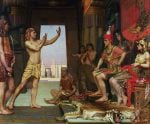Rosh HaShanah: The Beginning of Change II
Abstract This essay explores the profound connections between language, philosophy, physics, and spirituality in the context of Rosh HaShanah. By examining the linguistic roots of
Abstract This essay explores the profound connections between language, philosophy, physics, and spirituality in the context of Rosh HaShanah. By examining the linguistic roots of

Time is a storm in which we are all lost. ” (William Carlos Williams, Introduction to “Selected Essays”) I always had a hard time relating

The story of Joseph’s incarceration ends with his successful interpretation of the dreams of the Pharaoh’s chief butler and the chief baker. He ingeniously interpreted ordinary
Presented at the International Torah and Science Conference in Miami International University on December 18, 2005 Alexander Poltorak Introduction. This is the third in